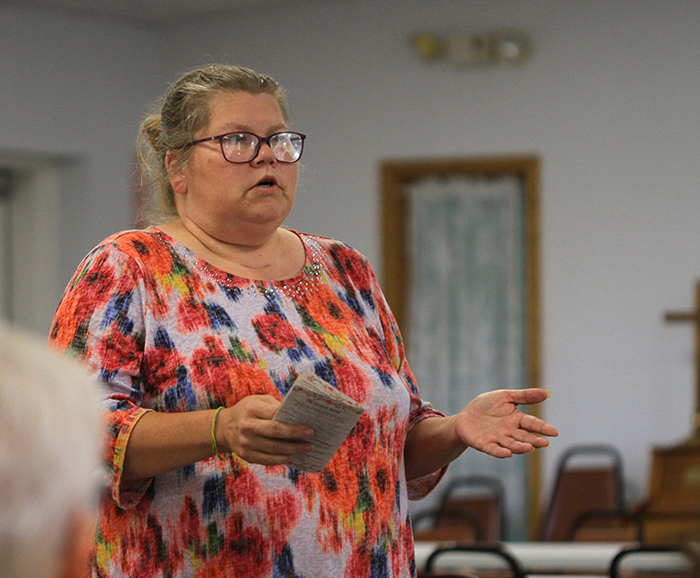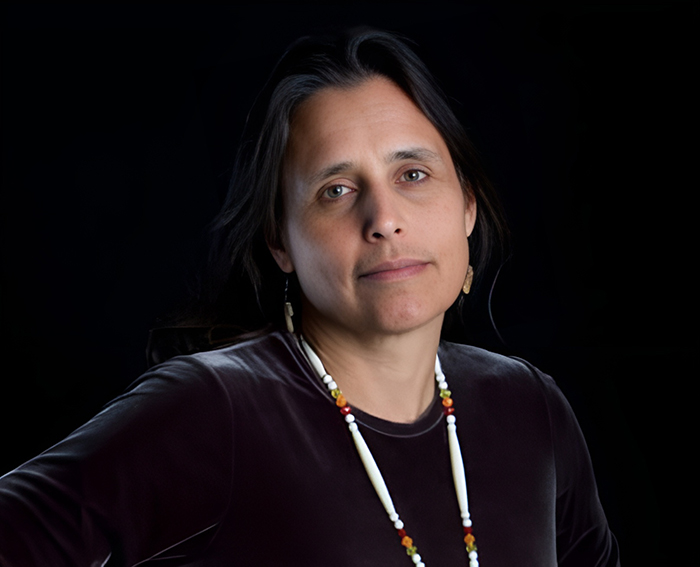LWML hosts White Earth Land Recovery Project director
News | Published on October 3, 2023 at 3:52pm GMT+0000 | Author: Tucker Henderson
0NYM used as an example of sharing cultures

White Earth Land Recovery Project executive director Maggie Rousu gave a presentation to the monthly meeting of the Lutheran Women’s Missionary League at Bethlehem Lutheran Church in Frazee Thursday, Sept. 28.
By Robert Williams
Editor
Maggie Rousu, the executive director of the White Earth Land Recovery Project (WELRP) gave a presentation on the mission and diverse ways the project provides goods and services to White Earth Nation on a visit to the Lutheran Women’s Missionary League at Bethlehem Lutheran Church in Frazee Thursday, Sept. 28.
The WELRP was founded by Winona LaDuke in 1989, who served as its executive director for 25 years. LaDuke is currently the executive director of Honor the Earth, where she works on a national level to advocate, raise public support, and create funding for frontline Native environmental groups.
“When you talk about the reservation, you very much talk about a food desert,” said Rousu.
Her point is based on the lack of grocery stores available to villages on the reservation. There is one grocery store in the entirety of the reservation, located in Mahnomen.
“A lot of people do come to Detroit Lakes and utilize Walmart, but how healthy is that food,” Rousu said.
The WELRP addressed food insecurity by growing organically and bringing food to families with recipes as part of its Meal Kit Project.
“Every month, we distribute 40 full meals that feed a family of four to homes on the reservation,” said Rousu. “One of the things in our meal kits, we always put an indigenous food in it.”
One of the recent kits included ingredients and a recipe for wild rice meatloaf. The kits also include coloring pages for kids with crayons.

“One of the things we have noticed is we are reintroducing those indigenous foods back into family’s diets and one thing that we know is that the diet that came to Native Americans from the federal government was not a healthy diet. It was processed flour and sugar, nothing like the wild rice, the maple syrup, the berries. That leads to a lot of health disparities among tribal people and that’s across the United States.”
Rousu gave the group historical examples from her own family and the tribulations they faced that created generational trauma and passing down behaviors to the next generation.
“One of the things I’ve done in my life is I’ve stepped away from that,” she said. “I learned about how my mom does some of the things she does. I learned about the history of my people and how to do something different. My kids also faced some of that historical trauma because I didn’t know things until I got older.”
Another aspect of the WELRP is The Mind Body Medicine Project, a holistic approach to managing one’s well-being.
“That is a program that teaches you how your mind connects to your body,” Rousu said.
The project teaches participants skills that help control stress, including deep belly breathing and meditation, something that has always been a part of the Anishinaabe way.
The eight-week course is held for 10 people with typically 40 people completing it per year.
WE Grow is another current program where families are assisted with tilling and caring for gardens, along with seeds and starter plants.
“The foods we grow are better than the foods you buy in a can,” said Rousu.
WELRP staff members will also assist families in planting and supply tools and follow each family throughout the growing season to offer encouragement through harvest, which includes canning and drying.
“That really makes a difference,” said Rousu.
The project also distributes individually-specific, raised, planting boxes to elderly or disabled people with soil and fertilizer.
“WE Grow is one of my favorite projects, because it not only works with adults, it works with youth and small children too,” said Rousu. “What we’re seeing is the whole family contributes to that garden.”
Despite having only a staff of 10, Rousu and her team provide much more to reservation residents, including Niijii Radio, based in Callaway and Native Harvest, an online and physical store (nativeharvest.com) in Callaway that specializes in reviving and protecting native seeds, heritage crops, naturally grown fruits, animals, wild plants, traditions and knowledge for the purpose of maintaining and continuing the culture and resisting the global, industrialized food system.
The namesake of the WELRP, White Earth Land Reclamation, works with the tribe on returning land to the original base of the reservation.
“Only 9 percent of the land on the reservation belongs to the tribe,” said Rousu. “The rest is owned by other people.”
WELRP has used donations to purchase land and have also received land donated to the project.
One donation of 100 acres was turned into a community garden, one of two in Callaway and Langby, the furthest southern and northern towns on the reservation.
“We’d like to do some in between, we just haven’t gotten to that point yet,” Rousu said.
The project also sponsors exchange days with communities to share the Anishinaabe culture, one being with New York Mills.
“They brought the Finnish culture to us,” said Rousu. “We brought the Anishinaabe culture to them, along with food, dance and music. That’s one of our big events that we do each year.”
More information on the many projects, online store and Niijii radio can be found at welrp.org.

